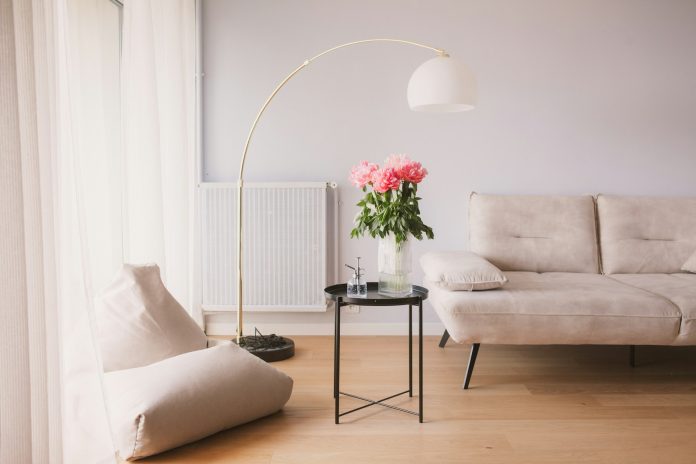In the quest for home comfort and aesthetic appeal, the choice of radiators is paramount. Not only do these fixtures play a critical role in heating our living spaces, but they also contribute significantly to the interior design of our homes.
Whether you have an old home or a new build home, energy efficiency is often at the forefront of many homeowners’ concerns, selecting the right radiator becomes a matter of both comfort and cost. This article explores the efficiency of radiators, addressing common queries such as “are bigger radiators more efficient?” and identifying the best radiators for heat pumps, all within the context of interior design.

Understanding Radiator Efficiency
Efficiency in radiators is determined by their ability to heat a room quickly and maintain temperature with minimal energy waste. It encompasses factors like material, design, size, and compatibility with your home heating system. Contrary to popular belief, the efficiency of a radiator is not just about size; it’s also about how well it matches the specific heating requirements of your space.
Are Bigger Radiators More Efficient?
The question of whether bigger radiators are more efficient is one that merits a nuanced response. Larger radiators have a greater surface area, which can indeed result in more efficient heat distribution within a room. However, efficiency is not solely about size but about the proportionality of the radiator to the room it’s heating and its compatibility with the home’s heating system.
A larger radiator in a small room might heat the space quickly but could lead to energy wastage or an uncomfortably warm environment. Conversely, a radiator that’s too small will have to work harder to heat a room, leading to inefficiency and increased energy costs. Thus, the key is finding the right balance, considering the size of the space, insulation levels, and the radiator’s output capability.
Best Radiators for Heat Pumps
Heat pumps are becoming increasingly popular in the UK due to their energy efficiency and lower carbon footprint. When pairing radiators with heat pumps, it’s crucial to choose models that can operate effectively at the lower temperatures heat pumps generate compared to traditional boilers.
Aluminium and certain modern steel radiators are excellent choices for heat pumps. Aluminium radiators, in particular, are known for their rapid heat conduction and responsiveness. They can heat up and cool down quickly, making them ideal for the efficient, low-temperature operation of heat pumps. Furthermore, their lightweight nature and contemporary designs can complement any interior space, blending functionality with aesthetics.
Designer radiators are another option for those looking to enhance their interior while ensuring efficient heating. Many designer radiators are specifically engineered to work well with heat pumps, offering high output and efficiency without compromising on style. From sleek vertical units that save space to statement pieces that double as art, there’s no shortage of options that cater to both heating needs and design preferences.

Radiator Size and Efficiency
The significance of radiator size cannot be overstated when striving for heating efficiency. Drake points out that larger radiators, especially taller vertical models, tend to be more efficient due to their larger surface area, allowing for a lower water temperature to achieve the desired heat output. This efficiency translates to less strain on boilers and reduced heating bills. However, an oversized radiator for a given space may lead to inefficiencies, underlining the importance of using tools like a BTU calculator to find the ideal size for your heating needs.
The Role of Electric Radiators
Addressing common misconceptions, electric radiators emerge as highly efficient alternatives, primarily due to their nearly 100% conversion rate of electricity to heat. Unlike traditional fan heaters, which lose energy in powering the fan, electric radiators offer a direct heating solution, making them particularly efficient for heating individual rooms as needed. Their modular nature allows for precise temperature control, further enhancing their efficiency.
Aluminium Radiators: A Superior Choice
Aluminium radiators stand out for their rapid heating capabilities and lower water requirements, making them an excellent choice for energy-conscious homeowners. Their quick response time and reduced need for water mean that boilers don’t have to work as hard, which not only saves energy but also reduces environmental impact. Aluminium’s recyclability adds an eco-friendly advantage, making these radiators an ideal choice for both efficiency and sustainability.
The Efficiency of Dual Fuel Radiators
Dual fuel radiators offer a versatile heating solution, particularly effective during transitional weather periods. By allowing the option to switch between central heating and electric heating, they offer a way to maintain comfort without the need to activate the entire heating system. This adaptability can lead to significant energy savings, particularly in seasons when full central heating is unnecessary.
Maximising Radiator Efficiency
Even without investing in new radiators, there are steps to improve your system’s efficiency. Regular maintenance tasks like flushing to remove sludge and bleeding to release trapped air can significantly enhance a radiator’s performance. Additionally, installing thermostatic radiator valves (TRVs) provides automatic temperature adjustments, further optimising energy use and reducing costs.
Considering Efficiency and Design
Incorporating radiators into your home’s design doesn’t mean sacrificing style for efficiency or vice versa. The market today offers a wide array of options that meet both criteria. When selecting radiators, consider:
- Material: Materials like aluminium offer quick heat up times and excellent thermal conductivity.
- Size and Output: Choose a radiator size and output that matches the heating requirements of your space for optimal efficiency.
- Design: Modern radiators come in various designs that can serve as a focal point or blend seamlessly with your decor.
- Compatibility with Heat Pumps: For homes with heat pumps, ensure the radiators are compatible for maximum efficiency.
Final Thoughts
The pursuit of the most efficient radiators for your home should consider factors beyond mere size or aesthetics. By understanding the dynamics of radiator efficiency, homeowners can make informed decisions that enhance both the comfort and design of their living spaces. Whether you’re retrofitting an older home with a modern heating solution or seeking to optimise a new build, the right radiators can significantly impact both your heating costs and interior design. Remember, the best choice is one that aligns with your specific needs, blending efficiency with style to create a warm and inviting home environment.






